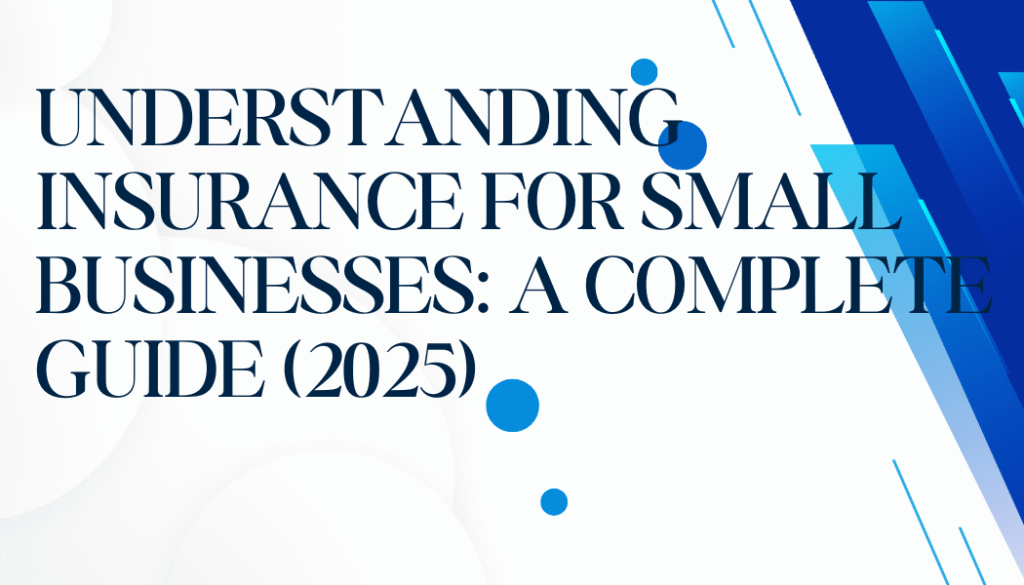🏢 Understanding Insurance for Small Businesses: A Complete Guide (2025)
Running a small business comes with big responsibilities—and big risks. One unexpected lawsuit, fire, or data breach can cripple a business overnight.
That’s where insurance steps in.
This guide will help you understand the types of business insurance, what’s legally required, what’s smart to have, and how to get the right coverage without overspending in 2025.

📌 Table of Contents
- Why Small Business Insurance Matters
- Is Business Insurance Mandatory?
- Core Types of Small Business Insurance
- Optional but Recommended Policies
- Industry-Specific Insurance Requirements
- How to Choose the Right Coverage
- Cost of Business Insurance in 2025
- Final Thoughts + CTA
💡 Why Small Business Insurance Matters
Business insurance protects your company from financial losses caused by:
- Property damage
- Legal claims and lawsuits
- Employee injuries
- Cyberattacks and data theft
- Customer disputes
Without it:
- One lawsuit or accident can drain your business finances
- You could be held personally liable if your business is unprotected
- You may lose client contracts that require proof of insurance
🔐 Insurance isn’t an expense—it’s a safety net for your future.
⚖️ Is Business Insurance Mandatory?
Some insurance types are legally required, depending on your location and business structure.
Common Mandates:
- Workers’ compensation (if you have employees)
- Commercial auto insurance (for business vehicles)
- Professional liability insurance (for regulated professions)
- General liability insurance (required by some landlords or clients)
🧾 Always check your state or country regulations and industry rules.
📦 Core Types of Small Business Insurance
Here are the main policies every business should consider:
1. General Liability Insurance
- Covers third-party injuries and property damage
- Protects against legal fees and settlements
- Required for many contracts or leases
2. Commercial Property Insurance
- Covers damage to office, tools, inventory from fire, theft, or storms
- Can cover repairs and equipment replacement
3. Business Owner’s Policy (BOP)
- Bundles general liability + property insurance
- Ideal for small to mid-sized businesses
- Often cheaper than buying separate policies
🧠 These form the foundation of most business insurance plans.
🧾 Optional But Recommended Policies
Depending on your business type and risk level, consider these add-ons:
| Insurance Type | What It Covers |
|---|---|
| Professional Liability (E&O) | Mistakes, negligence, bad advice |
| Cyber Liability | Data breaches, cyberattacks, ransomware |
| Product Liability | Injuries caused by your physical product |
| Commercial Auto | Vehicles used for business purposes |
| Workers’ Compensation | Employee injuries, medical bills, lost wages |
| Business Interruption | Lost income during downtime (e.g., fire, disaster) |
| Key Person Insurance | Death/disability of an essential team member |
💼 Choosing the right mix depends on your risks, industry, and assets.
🧠 Industry-Specific Insurance Requirements
Some industries have unique insurance needs.
Examples:
- Freelancers – Professional liability, general liability
- E-commerce stores – Product liability, cyber liability
- Restaurants – Liquor liability, food spoilage, equipment breakdown
- Construction – Contractor liability, builder’s risk, inland marine
- Healthcare – Medical malpractice, HIPAA-compliant cyber coverage
📌 Your insurance should match the risks you face daily.
🧮 How to Choose the Right Coverage
Here’s how to build a smart, custom insurance plan:
Step 1: Assess Your Risks
- Property damage?
- Client lawsuits?
- Online data?
- Physical inventory or vehicles?
Step 2: List Legal and Contractual Requirements
- Check lease agreements, licenses, client contracts, etc.
Step 3: Compare Quotes
- Use brokers or online platforms like Next, Hiscox, or Simply Business
Step 4: Choose Reputable Carriers
- Look for financial strength, good claims reputation, and fast support
Step 5: Review and Update Yearly
- As your business grows, so should your coverage
✅ One size doesn’t fit all—build a plan that reflects your actual exposure.

💰 Cost of Business Insurance in 2025
Pricing depends on:
- Industry
- Business size and revenue
- Location
- Coverage types and limits
- Claims history
Average Monthly Cost (U.S. Example):
| Policy | Estimated Monthly Cost |
|---|---|
| General Liability | $40–$75 |
| BOP (Liability + Property) | $80–$130 |
| Professional Liability | $60–$100 |
| Cyber Liability | $75–$120 |
| Workers’ Comp | $100–$200 (per employee) |
🧾 Combine policies to save—bundles and BOPs often cut costs by 20–30%.
🚀 Final Thoughts
Business insurance isn’t just about avoiding legal trouble—it’s about protecting everything you’ve worked so hard to build.
Whether you’re a one-person show or a growing company, having the right coverage in place means you can focus on growth, not worry.
👉 Ready to Secure Your Small Business?
Start with a Business Owner’s Policy. Then build from there based on your risk, industry, and future goals. Compare at least 3 quotes—and review every year as your business evolves.
Protect your dream. Insure your success.